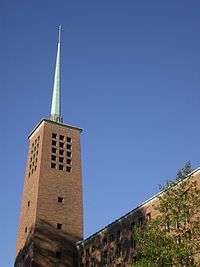Vanderbilt University Divinity School
 | |
| Type | Private |
|---|---|
| Established | 1875 |
| Dean | Emilie Townes |
| Postgraduates | 230[1] |
| Address |
411 21st Avenue South, Nashville, Tennessee, United States 36°08′48″N 86°48′03″W / 36.1467°N 86.8008°WCoordinates: 36°08′48″N 86°48′03″W / 36.1467°N 86.8008°W |
The Vanderbilt Divinity School and Graduate Department of Religion (usually Vanderbilt Divinity School) is an interdenominational divinity school at Vanderbilt University, a major research university located in Nashville, Tennessee. It is one of only five university-based schools of religion in the United States without a denominational affiliation that service primarily mainline Protestantism (University of Chicago Divinity School, Harvard Divinity School, Wake Forest University School of Divinity, Yale Divinity School, and Howard University School of Divinity are the others).
Early history

Vanderbilt Divinity School was founded in 1875 as the Biblical Department and was under the auspices of the Methodist Episcopal Church, South, one predecessor of the present-day United Methodist Church. In 1914, in concert with the University's severance of its ties with the MECS, the school became interdenominational and ecumenical, and in 1915, the school's name was changed from the Biblical Department of Vanderbilt University to the Vanderbilt School of Religion; it adopted its present name in 1956.[2] The present physical plant of the school, known colloquially as the "quadrangle" or "quad," was completed in 1960; the Benton Chapel that abuts the quad is named for a mid-20th-century dean, John Keith Benton. In 1966 the Graduate School of Theology of Oberlin College in Ohio merged with that of Vanderbilt, increasing the faculty resources of both the Divinity School and the Graduate Department of Religion, as well as the holdings of the school's portion of the University Library.[2]
Civil Rights era
In 1960, African-American Divinity student James Lawson was expelled from the university for his Civil Rights activism by Chancellor Harvie Branscomb.[3] One of Vanderbilt's trustees, James Geddes Stahlman, published misleading stories in a newspaper he owned, The Nashville Banner, which suggested Lawson had incited others to "violate the law" and led to his expulsion.[3] The Divinity School dean, J. Robert Nelson, who initially believed the stories,[3] eventually resigned in protest.[4] Moreover, with three of his colleagues, Nelson "paid Lawson's $500 bail when he was arrested on charges of conspiracy to violate state laws the day after his expulsion."[4] The school was placed on probation for a year by the American Association of Theological Schools, and the power of trustees was curtailed.[3]
Denominations served
Despite having ended formal association with Methodism nearly a century ago, the United Methodist Church is the largest beneficiary of graduates from the Divinity School, with sizable numbers ordained in denominations such as the Christian Church (Disciples of Christ) (which operates a seminarian apartment nearby the campus), the Presbyterian Church (USA), and African-American Baptist, Methodist, and Pentecostal groups. VDS, through the merger with Oberlin and an earlier absorption of Atlanta Theological Seminary, a Congregationalist seminary in Atlanta, Georgia, in 1929, maintains a historical relationship (although no legal ties) with the United Church of Christ as well.
Students come from throughout the United States, representing numerous denominations and traditions.
Leadership
The dean of the Vanderbilt Divinity School is Emilie M. Townes, formerly on the faculty of Yale Divinity School in Connecticut. Notable recent deans of the Divinity School include Joseph C. Hough, Jr., Sallie McFague, Walter Harrelson, and H. Jackson Forstman.[5]
Vanderbilt Divinity School is a member of the Association of Theological Schools in the United States and Canada.
Notable faculty
- Langdon Brown Gilkey - Professor (1954–63)
- Amy-Jill Levine - E. Rhodes and Leona B. Carpenter Professor of New Testament Studies
- Wilhelm Pauck - Distinguished Professor of Church History (1967–72)
- Jack M. Sasson - Mary Jane Werthan Professor of Jewish Studies and Hebrew Bible
- Choon-Leong Seow
- Kelly Miller Smith - former assistant dean
- Eugene Sutton
- Fernando Segovia - current president of the Society for Biblical Literature
- Paul C.H. Lim - Associate Professor of the History of Christianity
Notable alumni
- Kenneth Lee Carder (D.Min. in 1980) - United Methodist bishop
- Earnest Sevier Cox (1880-1966), Methodist preacher, white supremacist
- Al Gore - attended 1971-72 on a yearlong Rockefeller Foundation scholarship for people planning secular careers
- Clare Purcell (B.D. in 1916) - Methodist bishop
- Robert Hitchcock Spain (M.Div.) - United Methodist bishop
- Amy Welborn (M.A. in Church History) - Roman Catholic author, columnist, activist, academic and public speaker
- Don West - studied under Alva Taylor and Willard Uphaus
- Shelli Yoder (M.Div.) - Miss Indiana 1992, former Democratic Party nominee for U.S. Congress (IN-9)
See also
- Wilbur Fisk Tillett (1854-1936), early Dean
References
- ↑ "RE:VU: Quick Facts about Vanderbilt". Vanderbilt University News Service. Archived from the original on 2007-06-25. Retrieved 2008-05-20.
- 1 2 "Divinity School History". Vanderbilt University. Archived from the original on May 17, 2008. Retrieved 2008-05-20.
- 1 2 3 4 Sumner, David E. (Spring 1997). "The Publisher and the Preacher: Racial Conflict at Vanderbilt University". Tennessee Historical Quarterly. 56 (1): 34–43. JSTOR 42627327.
- 1 2 Cass, Michael (July 15, 2004). "Former Vanderbilt dean J. Robert Nelson dies at 84". The Tennessean. p. 3B. Retrieved December 17, 2017 – via Newspapers.com. (Registration required (help)).
- ↑ Johnson, Dale A., ed. (2001). Vanderbilt Divinity School: Education, Contest, and Change. Nashville: Vanderbilt University Press. ISBN 0-8265-1386-7.